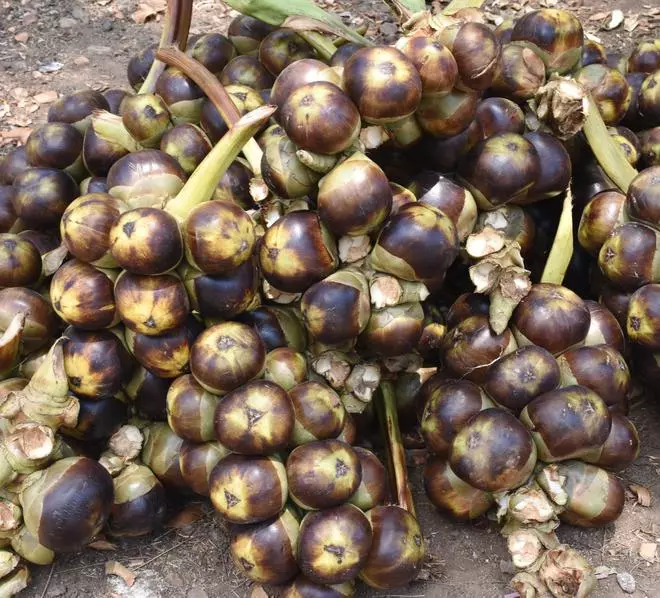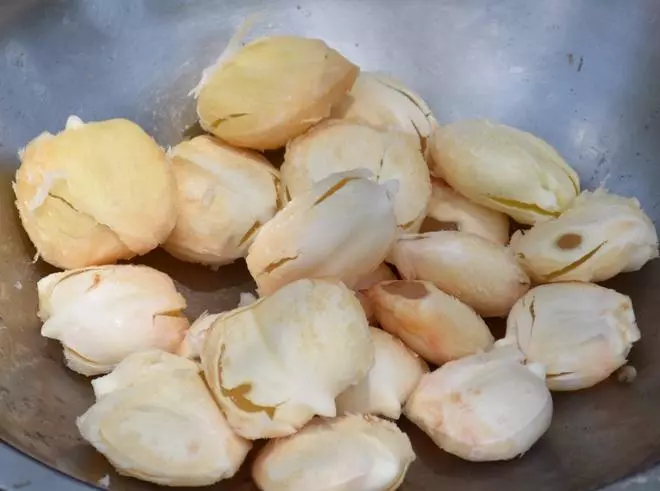In the Narmada district of Gujarat, Hitendra Vasava is cashing in on summer, quite literally.
A resident of Ranipara village of Nandod Taluka, Vasava makes ₹1,000 a day by selling ‘taad fali’ - a seasonal fruit of palmyrah palm also known as ‘nungu’ or ‘ice apple’ to visitors along the route of the famous Statue of Unity in Kevadia. This refreshing, jelly-like, highly nutritious Taad Fali is a travellers’ delight and tribals’ cash-king during summer.
For years, these palm trees - mostly unclaimed and unorganised - have been a source of temporary but promising seasonal employment for tribals of this region.
“Taad trees are mostly found in forest areas or along the borders of farmlands in the South Gujarat region. Tribals know its economic importance so they preserve it. During summer, a large number of tribals get engaged in this economic activity and make good earnings,” Arvind Machhar, Deputy Director of State information department at Narmada district.

It takes about 25 years for a palm tree to bear the fruits. But once it starts yielding, it can generate economic benefits anywhere between ₹5,000-10,000 per tree during the two months of summer, locals claimed. Taad fali is sold on weight at ₹100 per kg or at ₹8-10 a piece.
No growth for the ‘tall tree’
Unlike Tamil Nadu, which takes pride in Palmyrah Palm as its official tree, in Gujarat, experts find this tall tree an orphan. It is not an agricultural or horticultural plant nor is it considered in social forestry. Hence, there is no State support for cultivation.
Tamil Nadu, for example, has a special State scheme of raising Palmyrah palm plantation.

NN Patel, Deputy Director, Horticulture, Valsad said, “There is no specific scheme for this plantation as it doesn’t fall under horticulture purview. However, there are some local cooperative mandalis (societies) that coordinate the production and sale of Taad Gur and Nira (unfermented natural beverages).”
The issues
Even though Gujarat has successful cultivation of coconut and date palm in Saurashtra and Kutch respectively, taad cultivation has practical and legal issues.
The legal issue is that Gujarat’s liquor prohibition policy doesn’t allow incentivising the cultivation of a plant that can potentially be used for liquor.

“The development of palmyrah palm plantation is not encouraged because of the restrictive prohibition law in the State,” a top Gujarat government official told businessline. The highly-perishable nira turns sour and gets fermented as the day progresses. Eventually, it converts into Tadi or toddy (palm wine), which is banned in Gujarat.
Also read: Gujarat announces financial assistance for potato, onion growers
“Because of the prohibition, proposals regarding incentivising taad plantation are normally turned down. There are benefits of palm trees but there is also an adverse impact. If taad fali can be considered as the sole product, there is economic potential for tribal farmers to earn good from it,” said A K Garasia, District Agriculture Director from Valsad.
However, Khadi and Village Industries Commission (KVIC) is said to be providing marketing support for palm-related products, such as taad gur and nira, under strict regulations.
The other issue is of no ‘package of practice’. Unlike Mango, Sapota, or Banana cultivation, the taad plantation doesn’t have a ‘package of practice’ - a standardised scientific process of cultivation aimed at higher output i.e. plant/seed selection, sowing, maintenance, and harvesting.
A ray of hope?
Considering the economic and livelihood potential for tribal areas, palm products like Taad Fali can be provided marketing support through the organised framework of self-help groups at the village levels. “Such models can provide a professional touch to the retailing of taad fali and make it more organised and sustainable for tribals,” said Machhar.









Comments
Comments have to be in English, and in full sentences. They cannot be abusive or personal. Please abide by our community guidelines for posting your comments.
We have migrated to a new commenting platform. If you are already a registered user of TheHindu Businessline and logged in, you may continue to engage with our articles. If you do not have an account please register and login to post comments. Users can access their older comments by logging into their accounts on Vuukle.